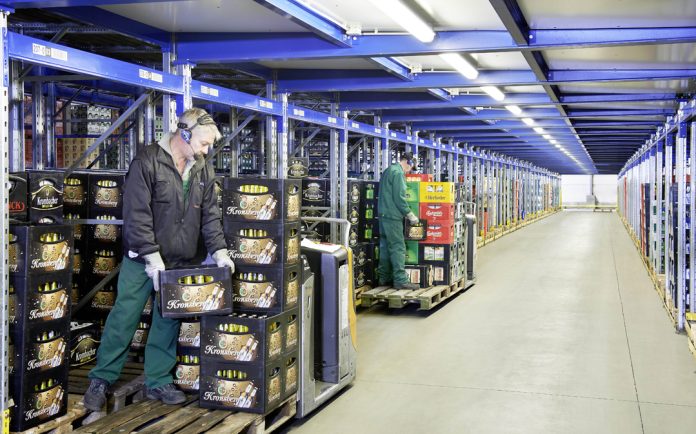Warehouse efficiency is vital in a dynamic market such as beverages, where flexible storage and picking is necessary to deliver operational efficiency – particularly during peaks
The beverage sector has undergone challenging times due to turbulent macro-economic events that are driving rises in materials prices and contributing to inflationary pressures amidst a cost of living crisis. Doing what they can to protect customers against price rises, beverage businesses are seeking efficiency within their intralogistics operations. Finding ways to improve these processes can give a retailer, wholesaler or producer an enormous boost.
Improved stock availability
Process improvement is a reason why BITO is seeing live storage for pallets or cases – with its inherent space-saving and First-In, First-Out (FIFO) characteristics – fast becoming a preferred solution for fast moving goods, overtaking conventional pallet racking.
These systems use gravity and inclined roller lanes that allow cartons and pallets to move smoothly from the loading to the retrieval position, offering enormous efficiency benefits compared to static pallet racking. As soon as a beverage case or pallet has been picked, the other cases or pallets in that lane move forward so that order pickers, and therefore customers, need not encounter stock shortages. The compact lane layout – both in racking width and height – provides high levels of storage density and makes optimum use of the available airspace in a warehouse. The increase in floor space utilisation over conventional racking can be as high as 60 percent. Perhaps most importantly, particularly during peaks, live storage enables sufficient replenishment quantities to avoid the risk of order picking downtime from running out of stock. This is particularly important for products such as mineral water, soft drinks, wine and beer that can see demand scale up rapidly during peaks.

Craft solutions
Wholesalers are businesses where it is not unusual to supply hundreds of outlets and have up a 1000 different product lines, all of which must be stored in FIFO order to comply with best-before dates. They will find Live Storage to be a cost-effective solution – especially when compared to automated storage and retrieval.
But the dynamic beverage sector also includes a growing multitude of small producers driven by the popularity of craft ales, spirits and soft drinks. Many of these producers, such as increasingly popular microbreweries, will have a customer facing environments, where products can be picked by the customers themselves, without help from shop assistants.
Small independent brewers seem, on the whole, to be overcoming the mounting pressures, spurred on by the demand for craft beers. The recently launched Craft Beer Report from the Society of Independent Brewers (SIBA) showed 40 percent of independent craft breweries now have a taproom (up 10 percent on 2022) and, on average, 27 percent of an independent brewery’s income now flows from sales direct to consumers via their taprooms, brewery shop or web shop – a huge increase for an industry historically heavily reliant on pub sales. For these operations, live storage lanes with a front incline are ideal for single bottle picking, whereas straight lanes are preferred for picking case loads.
Beverage sector companies of all kinds need to enhance their intralogistics to gain efficiencies that can be passed on to their customers. They want high volume utilisation from compact storage, a reduction of expensive storage surface, separate loading and picking aisles, improved staff efficiency and a constant availability of goods. They also want easy control of sell by dates, call of quantities and production batches and the elimination of idle times due to items being unavailable at the pick face. As a technique to deliver all of this, they would be well-advised to further explore live storage.



